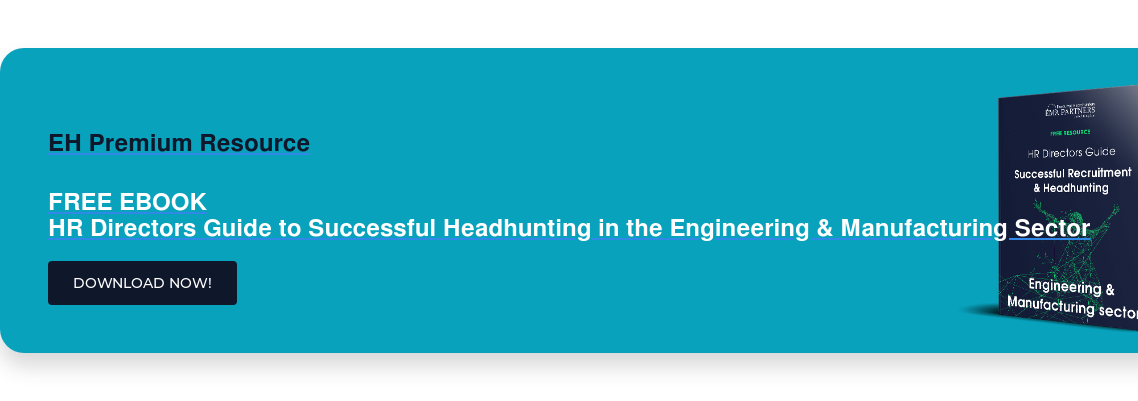Exactly why is staff training important for engineering firms? The chances are that if you work in a large engineering company, you likely work in a fairly sizable Human Resources department. Smaller firms may be able to get by with maybe one or two HR workers, but what about when you're working with a larger number of employees and clients? This is where it becomes necessary to have a more expansive HR team that can effectively handle the work.
As your HR team grows, you need to be sure that every member of the team is able to handle their own workload without relying on others. To ensure this, it’s vital that all your HR staff are fully trained in all relevant areas. By ensuring that staff training is provided for your HR department, you're also helping to develop your company’s talent pipeline for the future.
It can be easy to assume that your HR staff are sufficiently trained already or that anything other than core training isn’t necessary. But it’s important not to undervalue the importance of both initial and continued staff development training.
Here we'll outline some staff training ideas that will help you optimise your staff training and development.
Initial Training for New Hires

This is perhaps the most important training you can provide for your HR staff. When taking on a new hire it's vital that they hit the ground running. They should be provided with the most relevant and useful training possible. This will help them settle into their role quickly and avoid unnecessary confusion and stress. You shouldn't neglect to provide sufficient staff development training for new recruits, especially in a technical industry such as engineering. By doing this you're seriously running the risk of new hires becoming unable to handle certain aspects of the job. This increases the changes of the employee leaving shortly after being hired. In turn this ends up costing you more time and effort in replacing them, and costs your business more money.
In the long run, the financial and resource cost of providing training for new staff is almost always much less than the cost of replacing that hire six months later, for example.
Professional development for new hires allows them to develop their skills to help them advance their career. It also helps establish company loyalty. Make a good impression. Provide new employees with guidance and training during their first few months on the job. This will often make them hold you and the company in high regard, and therefore make them more eager to show loyalty.
You should also make sure to provide new employees with more than just basic training. Don’t think that the essential training is the only training that matters. When possible, consider any additional training that you think would benefit new employees, even if it doesn’t seem immediately relevant. You never know when the small cost of additional employee training can pay off down the line.
Also remember that any training you offer to new hires should also be offered to existing members of staff. You can’t be sure that all your HR workers have received the same training, and you don’t want to be offering new hires skills and knowledge that your existing staff don’t have.
Not Just HR Training
Working in the engineering sector often requires a lot of specialist knowledge. Many of the skills required to work effectively in engineering can be picked up with experience. However it can be beneficial to consider providing employees with staff development training in some aspects of engineering, regardless of their department. This can range from basic in house training on engineering terminology and processes, to detailed outsourced courses covering some of the specifics of your sector.
Due to the nature of the engineering industry, it's likely that all the employees in your firm will also have to undertake the necessary health and safety training. Specifically, this means ensuring that your employees’ knowledge of health and safety procedures abides by Health and Safety Executive (HSE) standards. More information on this can be found at the HSE webpage for Health and Safety in the Engineering Sector.
This is vitally important, as health and safety is first and foremost the most vital training for any employee in the engineering sector.
In addition to each employee’s individual health, it’s important that your workers are able to take care of each other. Staff who are fully trained in health and safety standards in engineering are also able to ensure that employees in other sectors are upholding these standards, and take the correct course of action. This means that teaching health and safety is beneficial to everyone, not just the individual. You should also train at least a few team members in first aid. This means that should an employee suffer any injury or medical emergency, there should always be somebody who is able to help immediately, and know the best course of action to take.
In addition, choosing to provide training in other departments, such as sales, marketing, or team management grants your workers transferable skills. These skills allow for flexibility within the workplace and the possibility of advancing their role within the company. For example, if at some point you require a new sales team member, you might consider transferring a current HR employee for whom you’ve provided sales training, rather than recruiting a brand new hire. This option would be beneficial as it can save time, money, and resources on finding hiring and training another employee. This is a great way of expanding your future recruitment options and strengthening your current talent pipeline.
Team Building Exercises

Quality staff development training also includes training your employees to be able to work together and communicate effectively. Realistically, an employee can be the most technically proficient or possess the most in-depth engineering knowledge. But if they don’t know how to effectively communicate and cooperate with others, they’re going to struggle in a highly dynamic workplace. Organising team building and cooperation exercises ensures that your HR staff are able to work effectively amongst themselves. It also helps them cooperate and work effectively with other sectors of your firm, which is an essential skill for HR workers.
There are various types of team exercises and ways to conduct them. You may wish to simply devote half a day to grouping your staff together, mixing departments if you wish, and encouraging them to complete problem-solving, teamwork-orientated tasks. Offering a reward for excelling at the teamwork exercise, such as a company meal or a similar incentive, is a method of encouraging full cooperation and participation. You want people to approach teamwork with genuine enthusiasm. The best way to do this is by rewarding their hard work and dedication.
In one of our previous insights we talked about engaging employees in the workplace engagement. Staff training and development is yet another way you can increase this. Staff who receive proper training, whether it be when they first start or after being in the role for years, are likely to feel more engaged in their work if they receive quality training and guidance to assist them.
This means that providing useful training not only improves your employees’ skillsets, but also their motivation levels, which can lead to increases in their output quality.
In House or Outsource?
This is where you have a bit of freedom. It can be tough to make this choice. Do you save money by conducting training yourself? Or do you save time by outsourcing specialist trainers to do it for you? The majority of the time, outsourcing trainers provides better quality training and a more in-depth learning and development experience than conducting the training yourself.
It’s beneficial if one of the senior staff conducts at least part of the employee training themselves. Doing this can provide a much more personalised experience for your workers. It allows them to learn first hand from people who have extensive experience in your firm, and the engineering sector. This ensures they gain the most relevant skills and knowledge from them. Manager-implemented training also has the additional benefit of helping bridge the gap between employees and members of management, another opportunity to nurture workplace engagement.
Have you considered encouraging worker self-training? This can be achieved by providing your existing and new employees with training resources that can be worked on either as part of their job, or in their own time as personal development. These resources can include engineering books and articles, HR guides, or online interactive courses and exams.
Encouraging personal training as well as enforcing workplace training is important. It pushes employees to show commitment and motivation to improve themselves independently, which is a necessary skill in any forward-thinking worker. It also allows staff to work on their personal development at their own pace and prioritise as they see fit, which is ideal for many people . Furthermore, self-learning encourages employees to develop their prioritisation and workload balancing skills.
To encourage employee self-learning, you may consider implementing a daily or weekly slot of ‘personal development time’. Regular allocated personal development time presents an opportunity to break up your employees’ workload. It also encourages productivity, self-improvement, and training for continued employee development.
The Internet as a Learning Resource

We're very fortunate to live in the internet age, where we have access to almost everything at our desks, and in our pockets. If you’re not encouraging extracurricular development using the internet, however minor it may be, you are risking wasting a massively useful resource.
If you want an easy way for your employees to share their learning and development resources amongst each other, look no further than social media sites such as LinkedIn. Career-orientated social websites like this allow your workers to keep informed of useful learning material such as articles, guides and conferences. They also ensure that everyone is up to date with the activities of other professionals and businesses in their sphere.
Tracking and Reviewing Employees Personal Development
Now that we've identified why staff training and development in HR is important, it’s time to cover how you can track and review your employees’ personal development once they’ve started training. There are a number of ways to achieve this and ideally you’ll probably want to implement a selection rather than just one.
Tracking Software in Online Courses
Should you decide to utilise some of the numerous online learning courses available, you will find that many of these courses include an online progress tracking system. Sometimes this is available for the employee to use to track their own progress, however some courses make their tracking system available to members of management as well. This means that you can easily keep track of the progress of your workers’ training and development.
It’s important that you choose the online course with the right content and progress tracking system for your company and management style.
Personal Development Meetings Monthly – Set Individual Targets (Individual Development Plan)
It’s important that you regularly check the learning and development progress of each employee in person. Setting up regular meetings between a manager and employee can be a great way of keeping up to date with your staff’s progress and making sure they're on track. These meetings can be monthly, quarterly, or even yearly. It all depends on the seniority of the staff and how comfortable you feel with the individual’s abilities and learning skills. As an example, it's usually a good idea to have more regular development meetings for newer hires, whilst you can afford to check up on senior staff less frequently. These meetings also allow you to learn more about how the individual is finding their training, and create a dialogue, meaning you can provide useful feedback and advice. Engaging employees’ on a personal level can go a long way to encouraging healthy personal development.
Performance Reviews Can Cover Development

Another option for reviewing developing is to incorporate this into your existing performance review process. By taking the time in each employee's performance review to discuss and review their performance targets, you can get a clear outline of where they are, and where they could be in the future. Make sure to engage the individual in this process. Ask them how they feel about their training and progress. This way you can make more effective changes to their learning and training structure. Be open to reviewing and altering their training scheme should the need arise. Bespoke training is always more valuable and effective than forcing an employee through a process that isn’t producing the right results.
Training Exams
Let’s get this out of the way; nobody likes exams. Exams and tests are stressful. However, they're also the most measurable and comparable way to gauge an individual’s abilities or knowledge. By providing a standardised format, individual results are easily categorised and measured against each other. This is the easiest method of quantifying overall and individual progress, but it’s also likely that your workers won’t be too pleased with having to do them! Tests are best used in conjunction with more personalised forms of evaluation in order to produce the most balanced results.
Outsourced Trainers Can Often Keep Track and Report to You
Many outsourced personal development trainer services include tracking capabilities, meaning they do the hard work for you. Depending on the service, they can often not only provide the training for your employees, but also keep track of each employee’s progress and hold meetings with them to discuss this. It can be beneficial to utilise trainers for this, as they're professionals who excel at understanding your workers and getting the best out of their development.
Learning Management Systems
Perhaps the best option for the implementation of quality training is through the use of Learning Management Systems (LMS). LMS are a hugely useful form of e-learning resource that can implement, manage, and track educational content such as online courses and lectures. They provide an easy, convenient way of administering training solutions to your workers. They also allow you to track the development of everyone involved. This can be incredibly useful especially for larger businesses or departments. Without an LMS, tracking and comparing individual progress can be very difficult. In terms of selection, you’re quite frankly spoiled for choice. There are hundreds of different LMS’s available, so picking one that suits your needs might be a tough task! In addition, if you require your employees to develop their technical skills and capabilities as well as their knowledge, some LMS also offer competency-based training as well as knowledge-based.
If you’re looking for a place to start, the Chartered Institute of Personnel and Development (CIPD) provide a variety of HR e-learning courses and systems aimed at employers who wish to unlock the full potential of their HR teams. More information on CIPD’s training options for employers can be found in the above link


